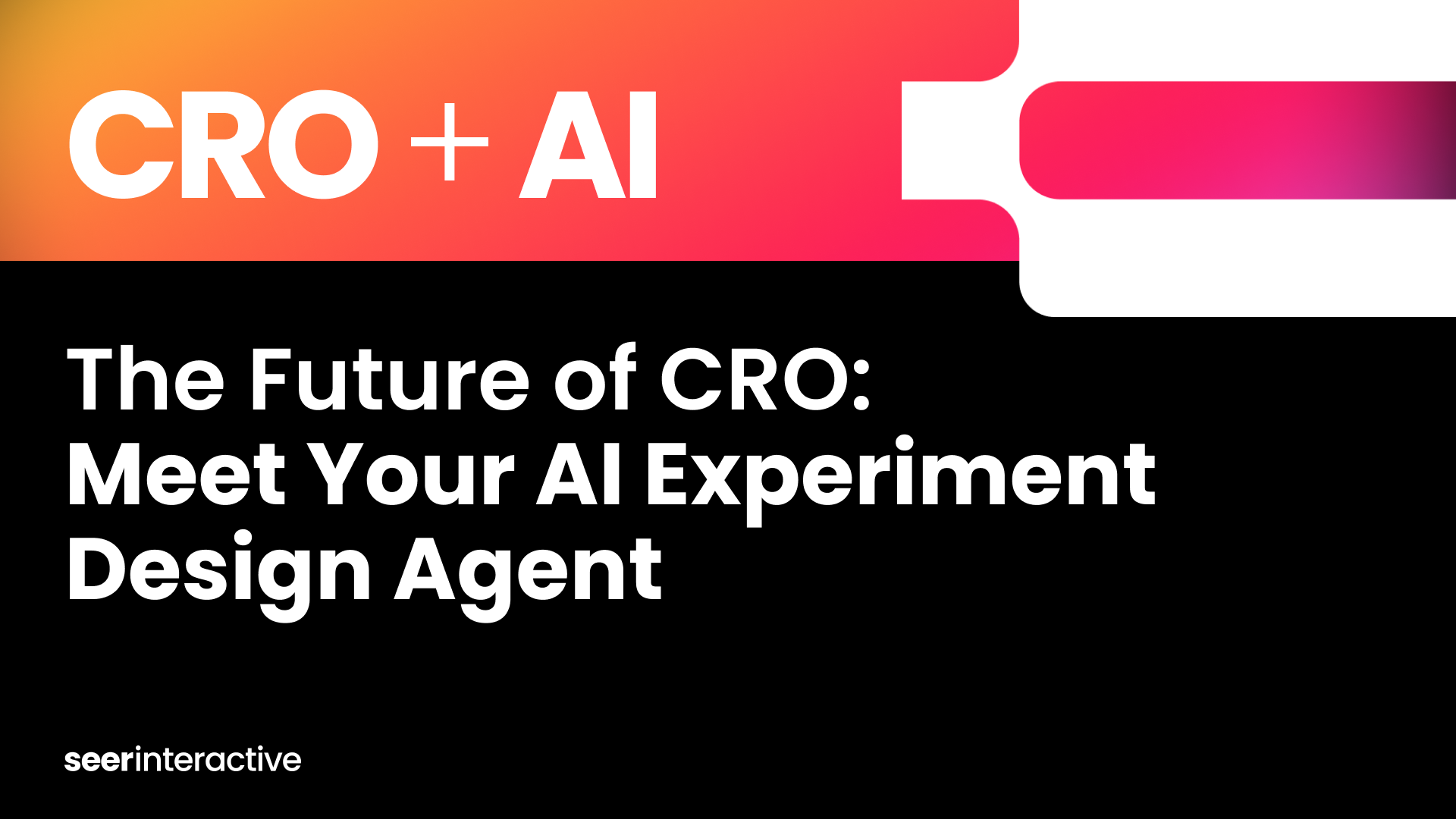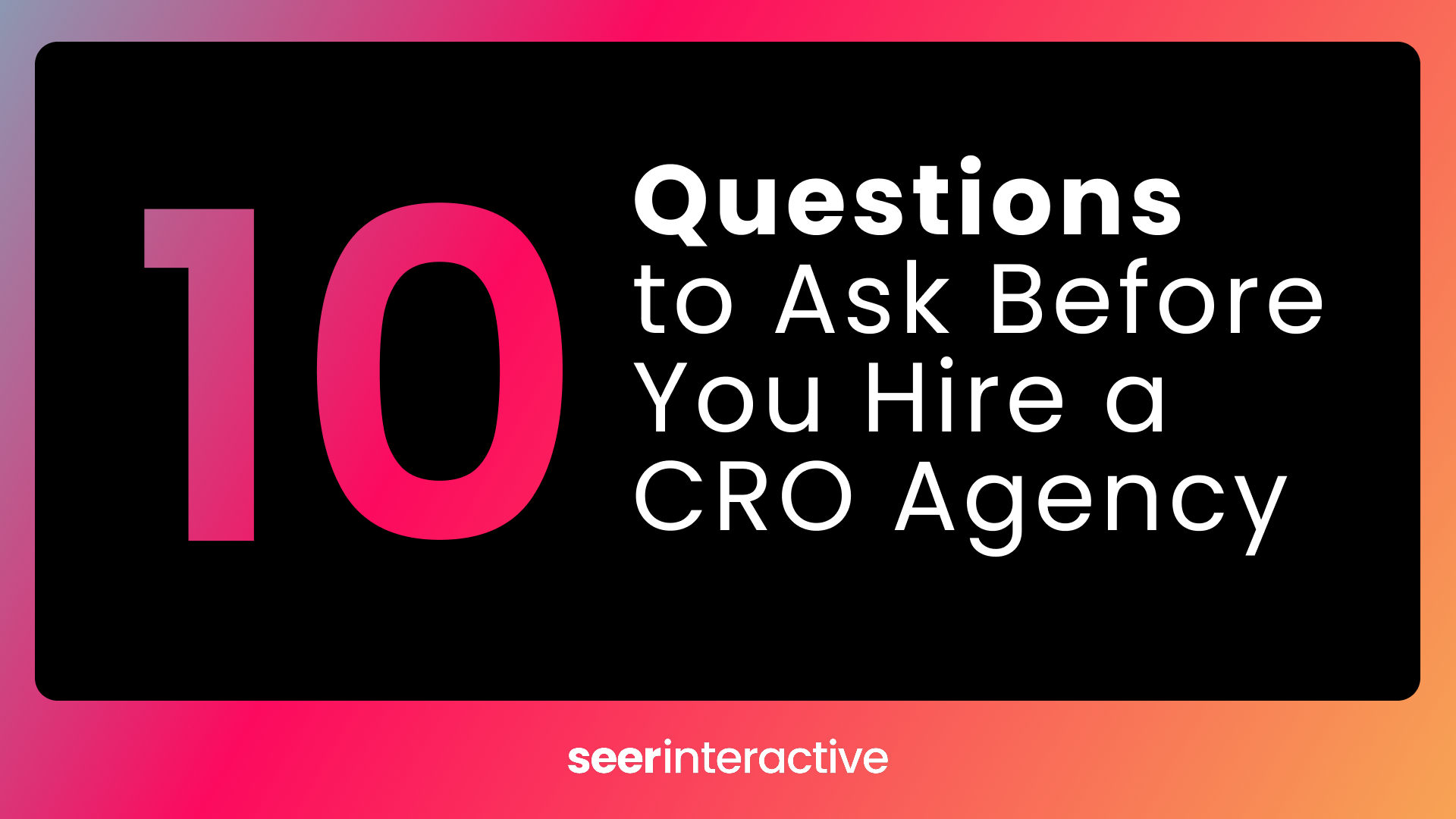It’s tough to know who to trust with your website’s performance & optimization. You know your site could be converting better, but with so many CRO agencies out there, how do you choose one that can align with your business goals, collaborate with your internal stakeholders, and help you drive measurable growth?
The right agency won’t run A/B tests and call it a day. They bring a strategic, forward-looking approach to optimization that integrates across your channels and targets. And yes, in 2025, AI is definitely a critical factor.
Once you know you’re ready for CRO, these 10 questions will help you evaluate potential agencies or partners across four key areas: Process & Strategy, Collaboration, Outcomes, and Innovation.
Process & Strategy
Not all CRO partners follow the same playbook. And the best ones certainly don’t wing it. Before you commit, you’ll want to understand how they uncover opportunities, structure their testing strategy, and, most importantly, use that to make decisions. These questions will help you separate teams with a real, scalable process from those who are just running experiments.
1. What does your research and analysis phase look like?
Every successful test starts with strong insights. Ask:
- How do you combine qualitative and quantitative data (like analytics reviews, user behavior tools, and customer feedback) to uncover opportunities?
- How long does this phase typically take and what deliverables will we receive?
2. What does your CRO roadmapping process look like?
You want to see how they turn research into action. Ask:
- Do you build a testing roadmap based on business goals?
- How far out does that roadmap plan?
This will tell you whether they’re reactive or proactive, and how much strategic thought goes into test sequencing.
3. How do you prioritize testing ideas?
Not all ideas are equal and without a clear prioritization framework, it’s easy to waste time on low-impact tests. Ask:
- Do you use a formal prioritization model to rank test ideas?
- How do you balance business impact, level of effort, and confidence when deciding what to test next?
- Who is involved in the prioritization process, and how often is the roadmap revisited?
Collaboration & Client Involvement
CRO isn’t a “set it and forget it” kind of service. Even the best agency needs your input to succeed. These questions help you understand what working together will look like day to day and whether your team has the time and resources to support the program.
4. What level of support and input is needed from our team?
Get clear on time commitments early. Ask:
- Will we need to review test designs, join regular standups, or approve copy and creative?
- Who from our team should be involved, and how much of their time will be needed?
Getting clear on this early helps you plan resources, avoid bottlenecks, and set your program up for real momentum.
5. What do we need to provide to ensure the program is successful?
Great results start with shared ownership. Ask:
- What access, tools, or collaboration your partner needs to hit the ground running?
Whether it’s dev support, analytics dashboards, design files, or decision-maker availability. This sets expectations on both sides.
Outcomes & Value
CRO both in-house and agency side gets trapped in the testing loop. But CRO is, at the end of the day, about business outcomes. These questions help you evaluate whether an agency is focused on what matters most: growth, conversions, ROI, and impact.
6. What’s your average impact for clients like us?
Push for specifics. Ask:
- What is typical test velocity?
- What do you typically see for win rates, and lifts in conversion rate, revenue, or lead quality?
Ideally broken down by business type or industry. Great CRO agencies will have benchmarks or case studies that speak to your goals.
7. How do you leverage other areas of expertise internally to drive results?
CRO should not exist in a vacuum. Ask:
- How do you collaborate with SEO, Paid Media, UX, or Analytics teams to build more effective experiments or uncover opportunities?
Integrated thinking often leads to higher-impact outcomes.
8. How do you support clients beyond just testing?
Not every insight needs to be tested to create value. Ask:
- Do you provide strategic input when testing isn’t feasible, like during low-traffic periods or dev freezes?
- Can you deliver value through design reviews, UX recommendations, or content strategy… even without a test?
- How do you help inform our broader roadmap, beyond experiment results?
A strong CRO partner acts as a growth advisor, helping you uncover and act on opportunities even when testing isn’t on the table.
Innovation & Future Readiness
9. How are you using AI to enhance your CRO efforts?
AI is reshaping how we uncover insights, personalize experiences, and scale experimentation. A CRO partner who knows how to apply AI effectively can help you move faster, spot patterns humans might miss, and generate smarter hypotheses. Ask:
- How are you using AI to analyze user behavior, generate test ideas, or identify high-impact opportunities?
- How do you ensure AI enhances and not replaces human insight in your testing strategy?
10. What’s your perspective on where AI belongs and doesn’t belong in the CRO process?
AI is powerful, but it’s not a silver bullet. A strong CRO partner should have a clear point of view on how they’re applying AI strategically. Ask:
- In what parts of your CRO process is AI genuinely useful and where do you avoid it?
- How do you balance automation with human context, creativity, and strategic alignment?
Misuse of AI? Everyone starts to fade into the sea of sameness.
Questions to Ask Yourself
It’s worth doing a quick gut check for you and your teams before you bring in a CRO partner. Even the most experienced agency can’t succeed without the right foundation on your side. These internal questions will help you make sure your team is set up to get the most out of the engagement.
Do we have clear KPIs, goals, and tracking in place?
You don’t need to have everything perfectly dialed in. But you do need to know what success looks like. Whether it’s conversion rate, revenue per visitor, or lead quality, aligned KPIs and reliable tracking are critical to measuring impact.
Do we have the buy-in and resources to implement UX or content changes?
No matter how strong the test strategy, it won’t move the needle if approved ideas never get launched. Make sure there’s alignment across teams, from leadership to dev to content, so that you can act on learnings and move quickly.
Choosing the right CRO partner goes beyond credentials. Find a team that aligns with your goals, works collaboratively, and intentionally delivers meaningful outcomes. These 10 questions are your shortcut to cutting through the noise and having a confident conversation while evaluating CRO agencies.
Vetting partners now? We’d love to walk through how we approach each one. Let’s talk CRO →


